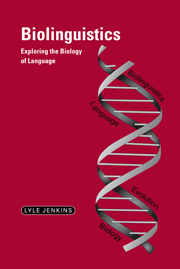2 - Knowledge and use of language
Published online by Cambridge University Press: 23 November 2009
Summary
THE FIVE FUNDAMENTAL QUESTIONS OF BIOLINGUISTICS
As already noted, since the earliest days of generative grammar five questions have been the focus of intensive research (see p. 1). Chomsky has often referred to question (1) as “Plato's problem,” question (2) as “Humboldt's problem,” and problem (3) “Descartes' problem,” to give some indication of the rich tradition, at times forgotten, of these classic questions (Chomsky, 1991a). In addition, Descartes' problem may be a special case of the problem of explaining how it is that the human science forming capacity sometimes yields a “partial convergence” with “our ideas and the truth about the world” (Chomsky, 1988a:158).
As Chomsky has noted, the answer to question (1), What constitutes knowledge of language? is of central importance to the study of the biology of language. This is because, to answer each of the questions (2)–(5), we have to have some idea of what the system of “knowledge” is. For example, to answer intelligently question (2), How is this knowledge acquired?, we need to know something about what knowledge the adult learner has acquired. If the computations of linguistic theory are properties of the language faculty, as will be argued, then these properties have to be accounted for somehow in a theory of language acquisition.
The same point can be made, with regard to physical mechanisms; i.e., question (4), What are the relevant brain mechanisms? To study mechanisms, you need to understand something about the computational properties of the system realized. As Chomsky says:
Now physics could not have developed the structure of the atom and the molecule if nineteenth-century chemistry hadn't provided the abstract theories. That's what told the physicists what they should look for. […]
- Type
- Chapter
- Information
- BiolinguisticsExploring the Biology of Language, pp. 57 - 75Publisher: Cambridge University PressPrint publication year: 2000



